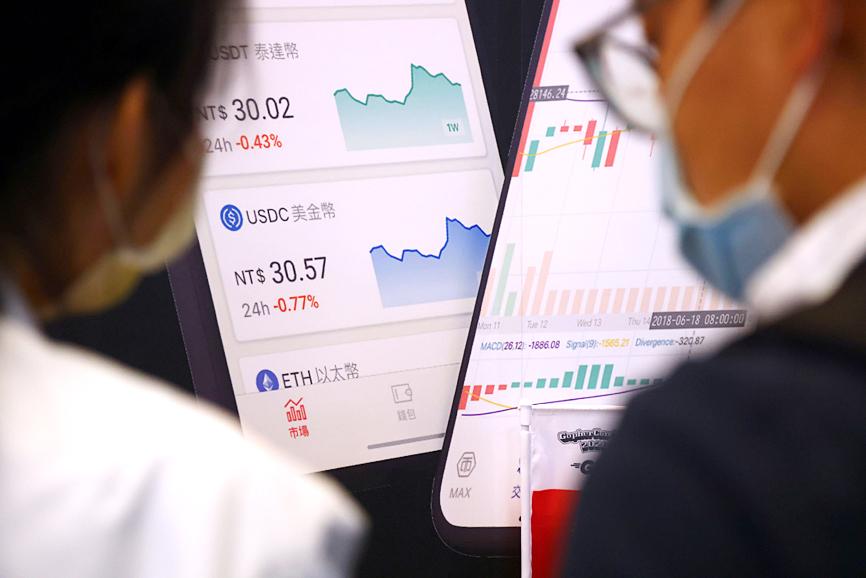Taiwan’s economy last quarter expanded 3.92 percent, surpassing an earlier forecast of 3.3 percent and prompting the Directorate-General of Budget, Accounting and Statistics (DGBAS) to steeply adjust its full-year growth forecast to 2.54 percent from 1.56 percent.
The expansion indicates a V-shaped recovery from a 0.58 percent decline in the second quarter due to the COVID-19 pandemic.
“Exports turned out much stronger than expected, with outbound shipments beating the agency’s estimate by US$6 billion in the third quarter,” Statistics Department head Tsai Yu-tai (蔡鈺泰) said.

Photo: Ann Wang, Reuters
Robust exports pushed up quarterly growth to the highest level since the second quarter of 2015, propelled by demand for 5G deployment, remote working and distance education, Tsai said.
Taiwan is home to the world’s largest contract makers of chips and electronics used in smartphones, notebook computers and data centers, allowing it to benefit from a crisis that has wreaked havoc on the global economy.
Outbound shipments this quarter might increase 7.75 percent year-on-year, as demand for new technology applications remains strong, the agency said.
Imports are expected to continue to decline by 1.65 percent, weighed down by cheap oil and the price of raw materials, although this effect is diminishing, it added.
Private consumption was disappointing, shrinking 1.48 percent, but easing from a 5.21 percent retreat three months earlier, it said.
Private investment has failed to meet expectations, with an expected annual pickup of 2.41 percent adjusted downward to 1.47 percent, Tsai said.
Consumer spending continued to take a hit from the pandemic, although the GDP component has greatly improved since the COVID-19 situation eased in May, he said.
Airlines saw passenger numbers in the third quarter slump 86.89 percent, while declines hovered at 10 percent for trains and other public transport, the agency said.
Private consumption might contract 2.52 percent for the year, deeper than an earlier forecast of 1.44 percent, it said.
The agency’s GDP growth forecast for next year was trimmed from 3.92 percent to 3.83 percent, after factoring in a higher comparison base this year and lingering effects of the pandemic.
The global economic outlook looks grim after European countries and US states shut down non-essential businesses to rein in COVID-19 cases, DGBAS Minister Chu Tzer-ming (朱澤民) said.
“Taiwan must stay alert,” Chu added.

CHAOS: Iranians took to the streets playing celebratory music after reports of Khamenei’s death on Saturday, while mourners also gathered in Tehran yesterday Iranian Supreme Leader Ayatollah Ali Khamenei was killed in a major attack on Iran launched by Israel and the US, throwing the future of the Islamic republic into doubt and raising the risk of regional instability. Iranian state television and the state-run IRNA news agency announced the 86-year-old’s death early yesterday. US President Donald Trump said it gave Iranians their “greatest chance” to “take back” their country. The announcements came after a joint US and Israeli aerial bombardment that targeted Iranian military and governmental sites. Trump said the “heavy and pinpoint bombing” would continue through the week or as long

TRUST: The KMT said it respected the US’ timing and considerations, and hoped it would continue to honor its commitments to helping Taiwan bolster its defenses and deterrence US President Donald Trump is delaying a multibillion-dollar arms sale to Taiwan to ensure his visit to Beijing is successful, a New York Times report said. The weapons sales package has stalled in the US Department of State, the report said, citing US officials it did not identify. The White House has told agencies not to push forward ahead of Trump’s meeting with Chinese President Xi Jinping (習近平), it said. The two last month held a phone call to discuss trade and geopolitical flashpoints ahead of the summit. Xi raised the Taiwan issue and urged the US to handle arms sales to

A magnitude 5.6 earthquake struck off the coast of Yilan County at 12:37pm today, with clear shaking felt across much of northern Taiwan. There were no immediate reports of damage. The epicenter of the quake was 16.9km east-southeast of Yilan County Hall offshore at a depth of 66.8km, Central Weather Administration (CWA) data showed. The maximum intensity registered at a 4 in Yilan County’s Nanao Township (南澳) on Taiwan’s seven-tier scale. Other parts of Yilan, as well as certain areas of Hualien County, Taipei, New Taipei City, Taoyuan, Hsinchu County, Taichung and Miaoli County, recorded intensities of 3. Residents of Yilan County and Taipei received

Taiwan has secured another breakthrough in fruit exports, with jujubes, dragon fruit and lychees approved for shipment to the EU, the Ministry of Agriculture said yesterday. The Animal and Plant Health Inspection Agency on Thursday received formal notification of the approval from the EU, the ministry said, adding that the decision was expected to expand Taiwanese fruit producers’ access to high-end European markets. Taiwan exported 126 tonnes of lychees last year, valued at US$1.48 million, with Japan accounting for 102 tonnes. Other export destinations included New Zealand, Hong Kong, the US and Australia, ministry data showed. Jujube exports totaled 103 tonnes, valued at